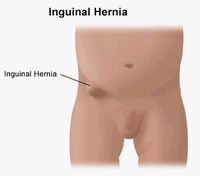Inguinal Hernia
Inguinal hernias in children are different than when we think of an adult hernia. Inguinal hernias are not caused by straining, they are congenital, which means they are present at birth – however they might not be visible for several months after your baby is born.
If your child has a hernia, which looks like a small lump or bump on their groin area, it’s cause for concern, but not worry. Inguinal hernias are relatively common, and are safely and quickly repaired, especially in the hands of a pediatric specialty surgeon.
What is an inguinal hernia?
The inguinal canal extends down the groin and normally closes on its own shortly after birth. If it does not close completely, and if this opening is large enough, the intestine or even an ovary can come into the canal creating a bulge in the groin region. This bulge is called a hernia. If fluid travels down this opening, it is referred to as a hydrocele.
Who can get an inguinal hernia?
An inguinal hernia can develop in the first few months after a baby is born because of weak abdominal (belly) muscles. They often occur in boys whose inguinal canals do not close after testicles have come into the scrotum, or in males whose testicles are undescended. Some children are at a higher risk of having an inguinal hernia, such as:
- Premature infants are three times more likely
- Children with a family history
- Children with other urogenital anomalies
- Children with other risk factors such as: cystic fibrosis, developmental dysplasia of the hip, undescended testes, abnormalities of the urethra and hydrocele.
How can I tell if my child has a hernia?

Inguinal hernias appear as a bulge or swelling in the groin or scrotum. The swelling may be more noticeable when the baby cries, and may get smaller or go away when the baby relaxes. If the bulge is pushed on gently when the child is calm it should get smaller or go back into the abdomen, known as reducing the hernia. Read more about identifying hernias here.
Is an inguinal hernia dangerous?
Occasionally, body parts that protrude through a hernia may become stuck and the hernia cannot be reduced (gently pushed back in) as it can be at all other times. When this happens, the body parts inside the hernia may lose their blood supply. This is called an incarcerated hernia and requires immediate medical attention.
If a hernia is no longer reducible, is hard, very painful, red or swollen, if the abdomen is distended, or if the child is vomiting, seek medical attention immediately.
Can I try to reduce an inguinal hernia?
If your child is not in discomfort you can try to reduce the hernia. Your child should be in a warm, comfortable position and lying down, which may cause it to reduce on its own. If not, try to push the bulge back into the abdomen with gentle pressure upward along the groin. Do not worry that you will cause harm, or if it is easily reduced and happens to slide back out, which is normal.
What should I expect from inguinal hernia surgery?
We recommend repair of all groin hernias regardless of age. Inguinal hernia repair surgery is a safe and common procedure, especially when performed by the trained pediatric surgeons at CHOC.
The surgery usually takes one hour. Pediatric-trained anesthesiologists will give your child general anesthesia, which will put them to sleep and prevent them from feeling any pain during surgery. A small cut is made in the belly button. A camera is inserted and CO2 gas is used to inflate the belly so there is room to see and work. One or two small incisions are made on the abdomen and very small instruments are inserted. The hernia is found and closed with sutures.
Sometimes an open surgery technique is used instead. In this method, a small cut is made in the groin along a skin crease. The hernia sac is traced to the inner abdomen where it originated. A stitch is placed there to close the opening. (Unlike adults, mesh is not needed in children.)
Children under one year of age may have both sides repaired. There is a high incidence of having a hernia on the other side, especially in girls. Normally the opposite side can be checked during surgery and repaired at the same time if needed.
Once the hernia is repaired, the cuts are closed with absorbable stitches and sterile bandages. Surgical glue may also be used to cover the incision, and will peel off on its own in about two weeks. A local anesthetic is injected into the wound to ease pain after surgery.
The surgery is usually an outpatient procedure for children older than three months of age. After surgery, your child will go to the recovery room. Most children go home on the same day. Some young babies, particularly if premature, will be watched overnight in the hospital after surgery.
For complete pre- and post-surgical information download one of CHOC’s Surgical Guides.